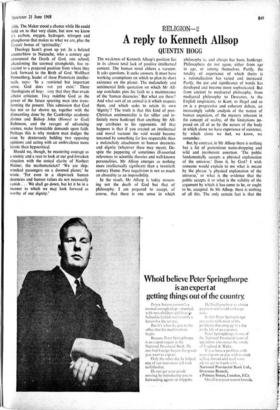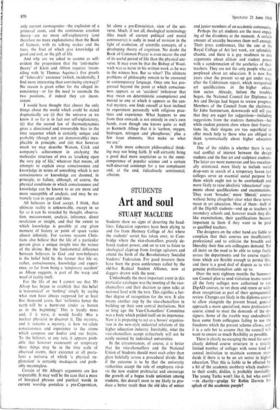A reply to Kenneth Allsop
RELIGION-2
QUINTIN HOGG
The weakness of Kenneth Allsop's position lies in its almost total lack of positive intellectual content. The human mind abhors a vacuum. It asks questions. It seeks answers. It must have working assumptions on which to plan its short existence on the planet. The melancholy and sentimental little quotation on which Mr All- sop concludes pins his faith to a maintenance of the 'human decencies.' But what are these? And what sort of an animal is it which respects them, and which seeks to retain its own 'dignity'? The truth is that this kind of post- Christian sentimentality is far sillier and in- finitely more bankrupt than anything Mr All- sop attributes to his opponents. All that happens is that if you created an intellectual and moral vacuum the void would become tenanted by something far less respectable than a melancholy attachment to human decencies and dignity (whatever these may mean). De- spite the peppering of sometimes ill-assorted references to scientific theories and well-known personalities, Mr Allsop emerges as nothing more intellectually significant than a twentieth century Hume. Pure negativism is not so much an absurdity as an impossibility.
In the result, Mr Allsop is today mourn- ing not the death of God but that of philosophy. I am prepared to accept, of course, that there is one sense in which
philosophy is, and always has been, bankrupt. Philosophers do not agree, either from age to age, or among themselves. Partly, the totality of experience of which theirs is a rationalisation has varied and increased. Partly, the use and significance of words has developed and become more sophisticated. But from ancient to mediaeval philosophy, from mediaeval philosophy to Descartes, to the English empiricists, to Kant, to Hegel and so on is a progressive and coherent debate, an increasingly subtle analysis of the nature of human cognition, of the mystery inherent in the concept of reality, of the limitations im- posed on all of us by the nature of the body in which alone we have experience of existence, by which alone we feel, we know, we remember.
But, by contrast, in Mr Allsop there is nothing but a lot of pretentious name-dropping and wild and incoherent assertion. 'The public fundamentally accepts a physical explanation of the universe.' Does it. by God? I wish someone would explain to me what is meant by the phrase 'a physical explanation of the universe,' or what is the evidence that the public accepts it or what is the validity of the argument by which it has come to be, or ought to be, accepted. In Mr Allsop, there is nothing of all this. The only certain fact is that the
only current cosmogonies—the explosion of a primeval atom, and the continuous creation theory—are no more self-explanatory (and therefore no more explanations) than the Book of Genesis, with its talking snakes and the trees, the fruit of which give knowledge of good and evil, or the gift of life.
And why are we asked to assume as self- evident the proposition that the 'anti-matter theory' of Klein and Alfren requires 'recon- ciling with St Thomas Aquinas's five proofs of "Jehovah's" existence' (which, incidentally, I find more interesting than convincing anyway)? No reason is given either for the alleged in- consistency—or for the need to reconcile the two positions, if indeed they are incon- sistent.
I would have thought that almost the only things about the world which could be stated dogmatically are (i) that the universe as we know it so far is in fact not self-explanatory, (ii) that the second law of thermodynamics gives a directional and irreversible bias to the time sequence which is certainly unique and probably (though not yet demonstrably) inex- plicable in principle, and (iii) that however much we may describe Watson, Crick and company's achievement in analysing the molecular structure of DNA as 'cracking open the very pip of life,' whatever that means, all attempts to explain away consciousness and knowledge in terms of something which is not consciousness or knowledge are doomed, in principle, to failure, although, of course, the physical conditions in which consciousness and knowledge can be known to us are more and more susceptible of analysis, and may be ex- tremely rare in space and time.
All believers in God accept, I think, that ultimate reality is unknowable, except in so far as it can be revealed by thought, observa- tion, measurement, analysis, inference, direct revelation or insight, and that the extent to which knowledge is possible at any given moment of history or point of space varies almost infinitely. For various reasons Chris- tians also believe that the life of a particular person gives a unique insight into the nature of the divine. But the fundamental difference between believers in God and non-believers is the belief held by the former that life or, rather, consciousness, knowledge and experi- ence, so far from being a 'temporary accident' as Allsop suggests, is part of the warp and woof of reality itself.
For the life of me I cannot see that Mr Allsop has begun to establish that this belief is 'nonsensical' or 'nothing' simply by saying what men have always supposed for at least five thousand years, that 'millennia hence the earth will be a burnt-out cinder as barren as in the beginning.' This is hardly news and, if it were, it would hardly take a nuclear physicist to discover it. The mystery, and it remains a mystery, is how we relate consciousness and experience to the atoms which compose our bodies and our brains. To the believer, at any rate, it appears prob- able that however evanescent or temporary these things may be in the time scale of observed events, their existence at all postu- lates a universe of which 'a physical ex- planation' is certainly inadequate and prob- ably meaningless.
Certain of Mr Allsop's arguments are less respectable. It may well be the case that a mass of liturgical phrases and poetical words in current worship postulate a pre-Copernican, let alone a pre-Einsteinian, view of the uni- verse. Much, if not all, theological terminology (like much of current political and moral controversy) is sadly in need of revision in the light of evolution, of scientific concepts, of a developing theory of cognition. No doubt the Book of Common Prayer is even nearer the end of its useful period of life than the physical uni- verse. It may even be that the Bishop of Wool- wich was as naïve in his written work as he was in the witness box. But so what? The ultimate problems of philosophy remain to be answered in contemporary language. Once one has pro- gressed beyond the point at which conscious- ness appears as an 'accident' (whatever that may mean on deterministic assumptions) and moved to one at which it appears as the cen- tral mystery, one finds oneself at least inclined to experiment personally with religious prac- tices and experience. What happens to one from then onwards is not entirely in one's own hands, even though one knows quite as well as Kenneth Allsop that it is 'carbon, oxygen, hydrogen, nitrogen and phosphorus,' plus a few trace elements, 'that make us what we are.'
A little more coherent philosophical think- ing may not bring faith. It will certainly bring a good deal more scepticism as to the omni- competence of popular science and a certain well-deserved contempt for a too complacent and, at the end, ridiculously sentimental, atheism.







































 Previous page
Previous page